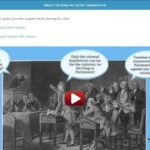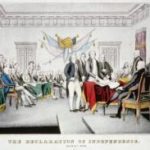The Declaration of Independence called George III a tyrant. And in 1848, a group of women’s rights activists mirrored our founding document to accuse men of the same crime. Today in our final revisit to the Declaration of Independence, we explore the Declaration of Sentiments, the document at the heart of the women’s suffrage movement.
Our guest is Laura Free, host of the podcast Amended and professor at Hobart and William Smith Colleges.
This short episode includes a one-page Graphic Organizer for students to take notes on while listening, as well as discussion questions on the back side.
Distance Learning: Civics for Civic Engagement in the Federal Courts
Distance learning activities become civics for civic engagement when federal judges bring the rule of law, separation of powers, judicial independence, and jury service into students’ daily life. Student voice is incorporated into every activity. Teachers and students can explore the pillars of literacy: rule of law, separation of powers, and judicial independence. With the guidance of federal judges and attorney volunteers in virtual court hearings, students learn and practice civil discourse skills as the foundation of effective dispute resolution in the law and in life.
The Road to Independence

This resource provides students with an English language video and associated student friendly readings (in English, Spanish, and Haitian Creole), as well as reading and video guides and self assessment tools. Using these, students will explore the road to independence and key events along the path to the Declaration of Independence!
Free registration is required to use the resource.
Prequel to Independence
In this activity, students sequence key events leading to the Declaration of Independence by placing documents in chronological order.
Excerpts From the Declaration of Independence
In this activity, students will examine excerpts from the Dunlap Broadside, the first printed and distributed copy of the Declaration of Independence.
Declaration of Independence: Fresh Takes
This lesson looks at one of 24 “fresh takes” on the Declaration of Independence collected by the Declaration Resources Project.
Founding Documents: Declaration of Independence Podcast
America declared independence on July 2, 1776. But two days later, it adopted this radical, revolutionary, inclusive, exclusive, secessionist, compromising, hypocritical, inspirational document. What does it say? What does it ignore? This episode features many scholars with differing opinions on the Declaration: Danielle Allen, Byron Williams, Cheryl Cook-Kallio, Woody Holton, and Emma Bray.
This short episode includes a one-page Graphic Organizer for students to take notes on while listening, as well as discussion questions on the back side.
Grade 9-10 What was Most “Revolutionary” About the Declaration of Independence?
This lesson will use a close reading of the Declaration of Independence to explore the American colonists’ reasons for separating from Great Britain. By the conclusion of the lesson, student will understand the role of the Declaration in encouraging support for American Independence, and in laying the groundwork for a new system of government and individual rights.
Grade 6 “When in the Course of Human Events:” Introducing the Declaration of Independence
This lesson will use a close reading of the Declaration of Independence to explore the American colonists’ reasons for separating from Great Britain. By the conclusion of this lesson, students should be able to identify the specific arguments made for Independence. Students will assess the objectives of the Declaration and identify if and how the drafters may have fallen short of some of their stated goals.
